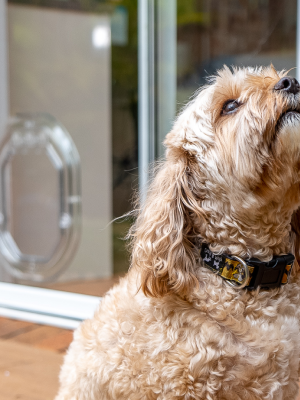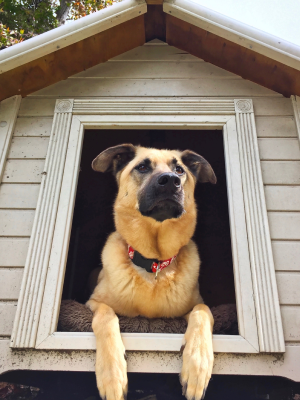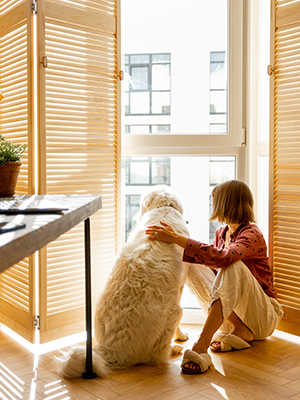
Many people think that living in an apartment means forfeiting owning a dog. However, that couldn’t be further from the truth. While some dog breeds need lots of room to run around, there are also plenty of pooches that are perfect for apartment living. Small dogs like Pugs and Shih Tzus adapt easily to apartment spaces. Even Great Danes and Greyhounds do well in apartments, despite their huge size. In this article we explain how to choose the right dog breed for your apartment, what to consider, and the most suitable dog breeds for apartments.
Our Blog
Our Blog
18/10/24
Best Dogs Breeds for Apartments
Many people think that living in an apartment means forfeiting owning a dog. However, that couldn’t be further from the truth. While some dog breeds need lots of room to run around, there are also plenty of pooches that are perfect for apartment living. Small dogs like Pugs and Shih Tzus adapt easily to apartment spaces. Even Great Danes and Greyhounds do well in apartments, despite their huge size. In this article we explain how to choose the right dog breed for your apartment, what to consider, and the most suitable dog breeds for apartments.
Should You Share an Apartment with a Dog?
If you prepare your apartment appropriately then you can share your apartment, and your life, with a dog. It is a different type of lifestyle than if you had a house with a backyard, however. Your furry friend won’t sneak out the pet door into the backyard for a run around. You will need to take your dog out at least twice a day, to give their legs a stretch and their noses a chance to sniff around.
Making Your Apartment Dog Ready
Preparing your apartment for a dog is in some ways similar to baby-proofing your home. Dogs are curious and want to know about the world around them, and their new environment. If you don’t want a dog nosing its way into a cupboard and finding cleaning chemicals, you need to secure that cupboard. Here is a list of things you can do to prepare your apartment for a new four-legged member of your family.
- Move Breakables & Valuables. Is there a valuable vase or statue sitting on a shelf that could get knocked and smashed? Move them to somewhere more secure and safe. Don’t leave other valuables like your passport or important documents around either as they may end up as chew toys.
- Create Boundaries. Close doors or even invest in baby gates, so you can restrict your dog to certain rooms of the unit. Close off the laundry room during the day to stop dogs finding cleaning chemicals or your basket of clothes, for example.
- Get a Crate. Crate training should start early in a dog’s life. They need to become accustomed to it and recognise it as their safe space and refuge. Have it comfortable and inviting for when you’re not home, so they begin to use it when they’re alone in the apartment.
- Clear Out Any Toxic Foods. Foods like garlic, onions and chives are all toxic to dogs. Secure these foods, put them on high shelves and lock the pantry to avoid the chance of your dog getting their nose into something they shouldn’t.
- Lock Away Medications. Your medications and those for your dog, need to be secured in a lockable cupboard. Overdosing on medications will lead to an expensive visit to the vet.
- Canine-proof Cupboards with Chemicals – Kitchen, Laundry. Cleaning chemicals beneath the sink in the kitchen need to be secured, so too in the laundry room. Buy some child-proof locks for those places you want to secure.
- Cover Electrics. Not only do you want to protect your appliances from being destroyed, you want to minimise the risk of your dog injuring or electrocuting itself.
What to Consider for an Apartment Dog
Living with a dog in an apartment is a different experience than in a house with a backyard. You have a number of things to consider, such as the space on your balcony, how noise will impact your neighbours, and more.
- How noisy is your apartment? Dogs don’t like it loud. They have excellent hearing and can hear noises four times farther away that we can. If your apartment is in the city, or there is construction going on, constant noise could distress your dog. Consider double-glazed windows to help reduce noise pollution.
- Is there anyone who is allergic to dogs? The first question to ask is if anyone in the home is allergic to dogs. If so, either find a non-allergenic breed, or begin a course of antihistamines. Ask your friends and family as well, so no visitors go into an allergic reaction.
- Are there parks and green spaces where you can easily exercise your dog? Your dog will need to be exercised, both for its health and your bonding. What parks, green spaces and off-lease places are in your neighbourhood where your dog can get out and have a good roam and sniff? Or do you need to take them in the car to find such places?
- Is the balcony pet safe? Could you use a pet door to get there and back? If your dog was on the balcony, would it be able to squeeze under the railing, or jump over the top? These two avenues of escape need to be secured. Additionally, consider a doggy door onto your balcony so they can get fresh air and sunshine if they choose. You don’t want to coop them up inside for hours at a time if you’re not there with them.
- Do you have plants that may be toxic? Look at the plants in your home. Do you have Aloe Vera, or Chinese Evergreen growing in your home? These are just two common house plants which are toxic to dogs. Do a plant audit and remove anything potentially hazardous to your dog.
- How old will the dog be? If you’re going to be buying a dog and still working in the office during the week, a young dog could prove troublesome. Puppies need a lot of attention and training when they’re young. They need boundaries and they need to bond with you. Senior dogs may be a better rescue option, as they’re already trained and may have lower energy levels and might not mind lounging in bed all day waiting for you.
- Dog Potty Grass. Sometimes called a pee pad, or grass potty, these are boxes of real grass to help dogs learn potty training. They drain and clean, you can water the grass and mow it. Having them in your apartment, especially on the balcony, while you’re out, can help prevent puddles and accidents on the floor.
Leaving a Dog Alone in an Apartment
Leaving your dog alone in the apartment can lead to separation anxiety. If you’re going to be away from your apartment for a lot of time, here’s some practical tips to help your dog cope.
- Lots of toys. We mentioned this above, but it is worth repeating. Get your dog a lot of toys to entertain themselves.
- Simple toys. Chew toys, ropes and such. Have some simple toys for the dog to play with.
- Leave the best toys for you and the dog. This can help the dog have their BEST experience with you. They will look forward to playing with you the most, rather than alone in the apartment.
- Walks in the morning & afternoon. Walking your dog is good for physical and mental health for both you and your dog. A morning walk can get a lot of energy out of your dog and allow it to have a good nap in the morning while you’re not there.
- Food games. A great way to keep your dog entertained and mentally stimulated, especially if they’re food motivated, is to have food-reward based games they can play during the day.
- A kong to entertain and reward. Kongs are chewable toys for dogs which you can stuff with wet, or dry food. They play with and chew the toy and food drops out as a reward. It’s a bit of a puzzle for them to solve.
- Hide snacks in the apartment. This is also a fun thing to do, getting your dog to investigate and search for food. Find different hiding spots each day to mix it up.
- Take them with you. If you have a dog-friendly office, consider taking your dog with you. Not only will they get to spend time with you, it’s a fantastic chance to do some socialisation. You can still include ideas such as food games and toys, and maintain some habits you’ve built with their home life.
- Make the time you are with your dog as valuable and enriching as possible. Invest TIME with your dog. Talk with them, engage with them, play with them. If they’ve spent all day alone in the apartment away from you, give them your full attention when you get home to make them feel loved and wanted. Yes, there are some breeds of dogs that don’t suffer separation anxiety, but they’re still happy to see you when you arrive home.
Why is it Important to Consider the Type of Dog for an Apartment?
Bringing home a dog on a whim when you live in an apartment is not a wise idea. You run the risk of the dog not fitting into such a small space, and if a worse case scenario happens, you have to surrender them for adoption, which is always heart breaking. Investigate different breeds of dogs, read the recommendations below for a start. Consider your environment and your suburban surroundings.
Things to consider before bringing a dog home:
- Security of the balcony if in high rise apartments. Ensure that small dogs can’t slip under the railing and, if you have a bigger dog, they won’t be able to leap over the railing.
- Calmer breeds won’t need as big a living space. Lower energy dogs suit apartments as they won’t be running around with the ‘zoomies’ in such a limited space. Bringing home a high-energy breed, such as a border collie, would not be a wise idea.
- Easy to maintain. You want a dog breed that is easy to maintain and look after. You generally won’t have a large laundry space to wash and groom your dog, so a high maintenance breed could be troublesome. You do have the option of doggie day care or a doggie spa option to help groom and maintain if you want, but this will come at a cost.
- How noisy will your dog be and will this upset your neighbours? A yapping or howling dog will quickly bring the ire of your neighbours down upon you, especially in cramped, high rise apartment blocks.
- What are your body corporate or apartment rules regarding pets? There may be articles in the building code or body corporate agreement which state you’re not allowed to have pets. Check the fine print before you choose to adopt a dog to save yourself hassle and inconvenience down the track.
Best Dogs Breeds for your Apartment
Here is a list of 10 breeds we feel are the best for apartment living. They are listed in no particular order, so if you’re umming and ahhing over a Pug versus a Poodle, don’t fret, either choice is a good one.
Greyhound
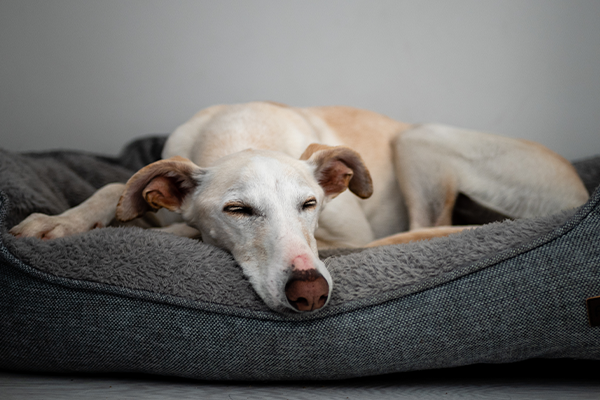
This may seem like an unusual choice for an apartment dog. They’re most often associated with running at speed around a race track, so how do they become a great breed for an apartment? Surprisingly they don’t need to run all the time. A 30 minute walk will keep them happy. They’re quite content relaxing and lounging around on their bed.
Greyhounds are low shedding, which is good for cleanliness. They’re a quiet breed, not barking much at all, which is great for close apartment living. They are quiet, gentle dogs who can be incredibly loving and cuddly.
Their calm demeanour can hide some separation anxiety and, depending on their history, there could be some panic if they’re not with their owner.
Pug
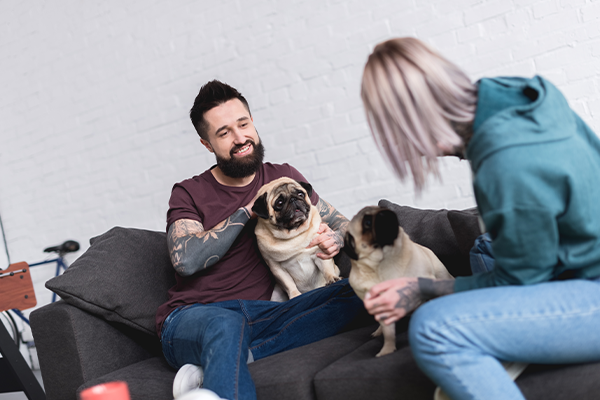
This cuddly little dog can be perfect for apartment living. They are often calm and affectionate and while they can sometimes be energetic, little legs means they won’t be running around too much. A quick 20 minute walk will have them puffing and needing a drink and a nap.
Their affectionate nature can lead to some separation anxiety, so look out for that. They’re also a dog that sheds, so have a cleaning plan in place so you’re not overcome by Pug fur. It’s only short fur, which is a blessing.
Pugs are also a breed that doesn’t bark too often, which will keep the peace with your neighbours.
King Charles Cavalier Spaniel
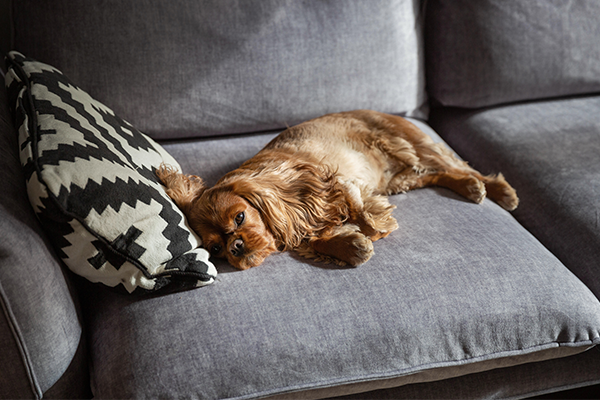
Some say that if you looked up cute in the dictionary you’d find a picture of a King Charles Cavalier spaniel. Adorable, cuddly and the ultimate lap dog, these dogs are quiet, gentle and totally adore their owners. This, of course, can lead to intense separation anxiety. While their energy levels are not high, so there may not be too much damage to your apartment, it can lead to doggie depression.
These dogs are long-haired and they shed, so be aware of that, and they can be a little yappy when excited. They love people so the option to take them to work with you and have all your team members gushing over your dog is a good idea. They are easy to train, which makes work adventures easier to manage.
French Bulldog
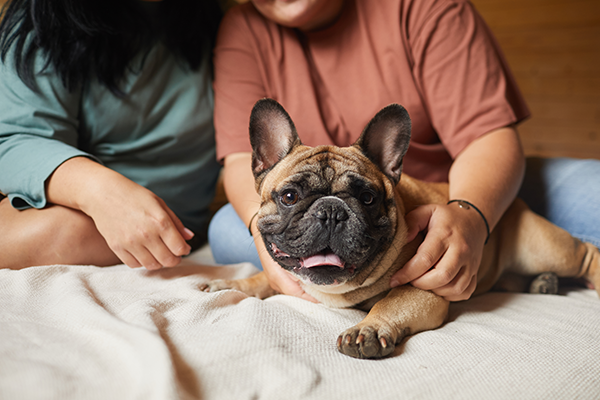
Frenchies at tiny, adorable, quiet and well behaved dogs. They’re short-haired and hardly shed at all, which is ticking so many boxes for being perfect apartment dogs. Quiet, they rarely bark but will get yappy if startled by sudden and unknown noises. If you live in a noisy neighbourhood, this could be an issue. Toys, some with a squeaker, could help them become accustomed to noises.
They are low energy dogs, needing only a half hour walk to satisfy them, but be aware of the tiny dog zoomies.
Miniature Poodle
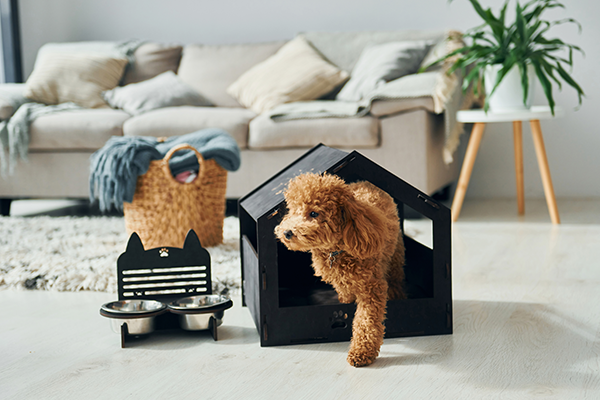
Smaller than their cousins, poodles, these miniature breeds are great apartment dogs for people who have small living spaces but love to get out and about. Poodles have a woollen coat, not fur. This is fantastic for those who have dog allergies. It also means they don’t shed very much. Two birds, one doggy.
They are high energy dogs and tend to get yappy, so if you’re away from your home a lot, you might want to consider this. You need to engage them in mental and physical stimulation as they are also quite intelligent. This will endear you to a miniature poodle and they will have some separation anxiety without you.
Yorkshire Terrier
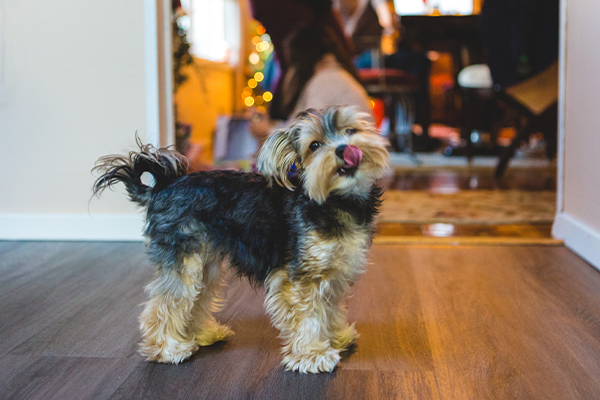
Yorkshire terriers are a very popular breed. They’re easy to train and they’re very affectionate. They are active dogs who love to play with their owners. This could cause separation anxiety that can translate into some destructive behaviour, for worse case scenarios.
These energetic little dogs need a lot of exercise and stimulation. Lots of walks in the park, off leash as well, to stimulate and tire them out. This need for exercise and movement may lead to a lot of barking. They are bright, intelligent dogs and great companions.
Boston Terrier
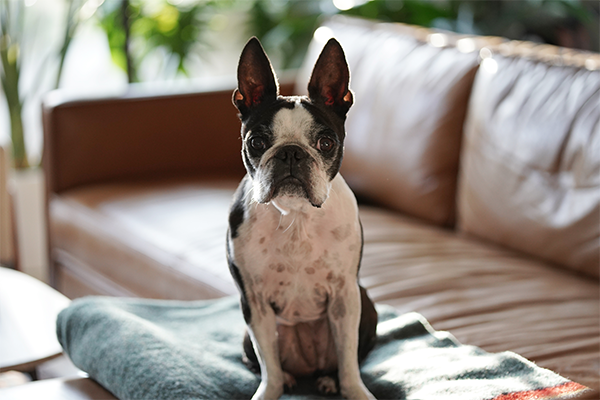
These little treasures are energetic and playful but also perfect for apartment living. Indoor toys and games will keep them occupied, and a short walk of 30 minutes or so will have them ready for a nap.
With short hair they don’t shed much which saves on cleaning duties and is also good news to those allergic to dogs. These dogs are also not too vocal, so your neighbours will be quite happy.
Shih Tzu
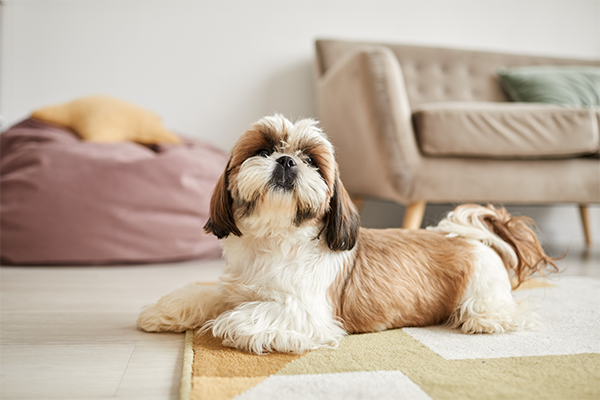
These ‘Little Lions’ are friendly little dogs who love people. If you’re out and about for too many hours, it could cause some problems. They are trainable and would do well in the office, just saying.
They have low energy so are perfect to lounge around on your lap, or in a bed, chilling. However, they can be a little bit yappy, despite their calm demeanour, so the neighbours may kick up a fuss.
Shih Tzus are a medium haired breed so shedding could be an issue. Even though they are low energy they do enjoy a good walk in the park and some toys to romp around within the apartment to keep them stimulated and fit.
Great Dane
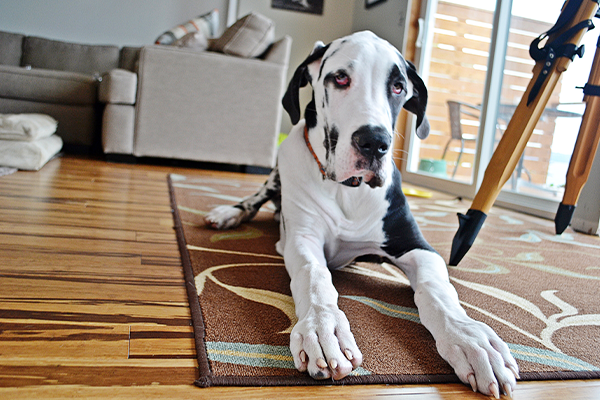
Some of you may be thinking we’re crazy for putting a Great Dane on this list. These dogs are huge, all legs, but they make perfect companions in smaller living spaces. They have low energy levels and are quite happy being lap dogs and curling up with you on the couch for hours at a time. Yes, lap dogs. Great Danes really don’t have a concept of how big they are.
Low energy means a short walk in the morning and the evening is generally enough for them to be happy. This docility also means they’re not much with the barking. If they do bark you’ll certainly know it, being loud and deep bass WOOF. But that rarely happens.
Being short haired is good for cleaning and allergies as they don’t shed a lot.
Dachshund
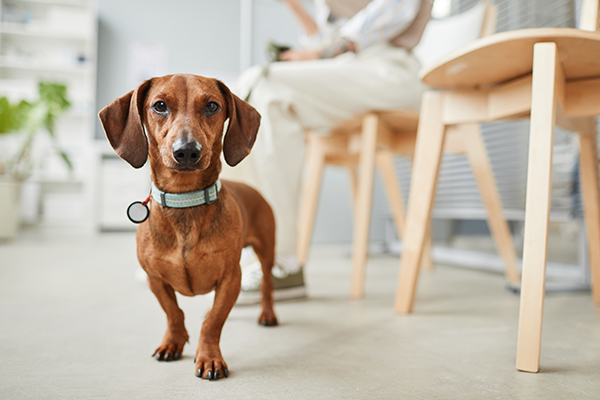
Small in stature these dogs fit well into apartment life. With their little legs, a brisk 30 minute walk is all they really need to keep them fit and healthy.
Intellectually they need stimulation. They are a smart breed, easy to train, but they need interaction with you, and toys, to keep them stimulated. This intelligence may make them a bit yappy, wanting attention and more interaction with you, but generally they are a quiet dog.
Short haired, so not so much shedding, and short legs means not much risk of knocking things off high shelves.
Bringing a dog into your apartment and into your life is a big decision. It will increase your responsibilities, but the rewards will be those loving eyes and wagging tail of unconditional love. Making sure you have the right dog to suit your lifestyle, which includes where you live and how you live, will help bring a rich and fulfilling life for both of you.
Latest Posts
Latest Posts
Questions? We’re here to help.

